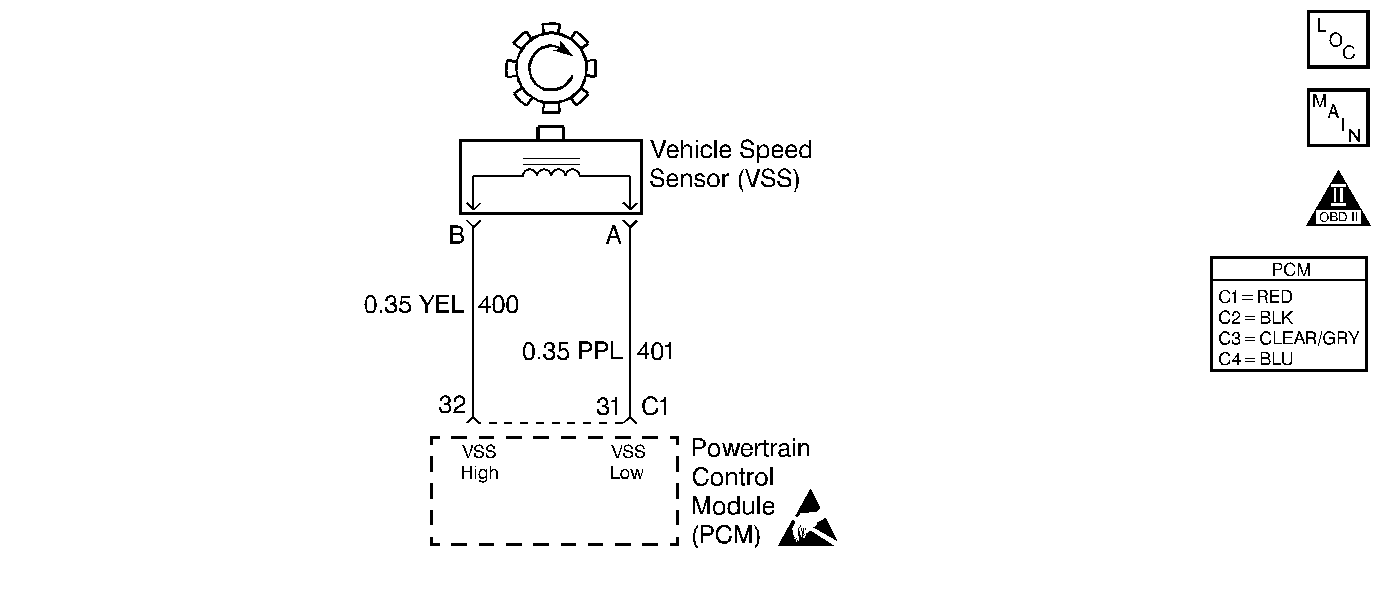
Circuit Description
A toothed wheel mounted on the output shaft of the transmission generates an AC voltage pulse as it moves past the Vehicle Speed Sensor (VSS). The VSS contains a permanent magnet surrounded by a coil of wire, which produces a magnetic field. As the toothed wheel interrupts the magnetic field, an AC voltage pulse is generated. As the vehicle speed increases the AC voltage pulse rate also increases.
The PCM supplies this signal to the cruise control module and instrument cluster.
Conditions for Setting the DTC
| • | DTCs P0106, P0107, P0108, P0117, P0118, P0122, P0123, P0506, P0507, P1508, P1509 not set. |
| • | Engine coolant temperature greater than 0°C (32°F) |
| • | Engine speed greater than 1000 RPM. |
| • | TP sensor angle greater than 5%. |
| • | Barometric pressure greater than 40 kPa when A/C is OFF. |
| • | Barometric pressure greater than 45 kPa when A/C is ON. |
| • | All conditions met for 25 seconds. |
Action Taken When the DTC Sets
| • | The PCM will illuminate the Malfunction Indicator Lamp (MIL) on the second consecutive drive trip that the diagnostic runs and fails. |
| • | The PCM will record operating conditions at the time the diagnostic fails. The first time the diagnostic fails, this information will be stored in Failure Records. If the diagnostic reports a failure on the second consecutive drive trip, the operating conditions at the time of failure will be written to Freeze Frame and the Failure record will be updated. |
Conditions for Clearing the MIL/DTC
| • | The PCM will turn the MIL OFF after three consecutive drive trips that the diagnostic runs and does not fail. |
| • | A last test failed (Current DTC) will clear when the diagnostic runs and does not fail. |
| • | A History DTC will clear after forty consecutive warm-up cycles, if no failures are reported by this or any other emission related diagnostic. |
| • | PCM battery voltage is interrupted. |
| • | Using a Scan tool. |
Diagnostic Aids
If all circuits to the PCM and the VSS have been thoroughly checked, inspect terminal connections at VSS harness connector and at the PCM harness connector. If all connections check OK, replace the PCM.
For intermittents, refer to Symptoms .
Test Description
Number(s) below refer to step numbers on the diagnostic table.
Step | Action | Value(s) | Yes | No |
|---|---|---|---|---|
1 | Was the Powertrain On-Board Diagnostic (OBD) System Check performed? | -- | ||
Does the scan tool indicate a vehicle speed above the specified value? | 0.0 mph/km/h | Go to Diagnostic Aids | ||
3 |
Does the scan tool indicate a vehicle speed above the specified value? | 0.0 mph/km/h | ||
4 | Repair the faulty VSS connection or faulty VSS. Is the action complete? | -- | -- | |
5 | Using a DVM (J 39200), measure voltage from VSS signal circuit to a known good ground. Does the DVM indicate the specified value? | 5.0 V | ||
6 | Using a DVM (J 39200), measure voltage from the VSS signal circuit to the VSS ground circuit. Does the DVM indicate the specified value? | 5.0 V | ||
7 | Check calibration ID for the most current and/or incorrect calibration. Is the most current and proper calibration present? | -- | ||
8 |
Important:: Replacement PCM must be programmed. Refer to Powertrain Control Module Replacement/Programming . Replace the PCM. Is the action complete? | -- | -- | |
9 | Repair the signal circuit to the vehicle speed sensor. Is the action complete? | -- | -- | |
10 | Repair the ground circuit to the vehicle speed sensor. Is the action complete? | -- | -- | |
11 | Install proper calibration and/or most current. Is the action complete? | -- | -- | |
12 |
Does the scan tool indicate that this test ran and passed? | -- | ||
13 | Using the scan tool, select Capture Info, Review Info. Are any DTCs displayed that have not been diagnosed? | -- | Go to the applicable DTC table | System OK |
